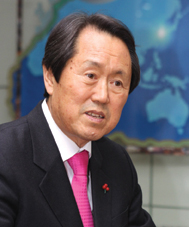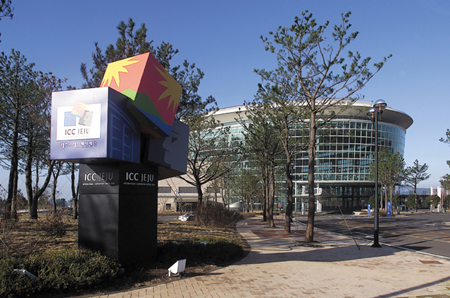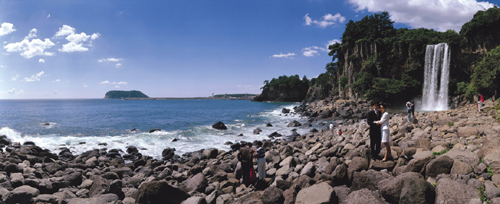Jeju, Venue of ASEAN-ROK Commemorative Summit
Hosting the summit will likely boost its int'l standing as tourism and leisure resort hub in N.E.Asia


The following are excerpts of an interview between NewsWorld and Gov. Kim Tae-hwan of Jeju Special Self-governing Province, who touched on his provincial government's preparations for hosting the summit.
Question: What is the significance of holding the ASEAN-ROK Special Summit on Jeju?
A: The international event will be the first multinational summit in which the heads of 11 foreign countries will take part and also the first ASEAN-ROK Summit marking two decades since Korea first set up relations with ASEAN, which is very significant. Jeju Special Self Governing Province is known for its peaceful setting and, therefore, a number of important international meetings have taken place there. In April 1991, the first Korea-Soviet Union summit was held, followed by a Korea-U.S. summit in April 1996, a Korea-Japan summit in June 1996 and again in 2004.
The upcoming summit will be an important turning point for Jeju to move ahead, as it is expected be a base for President Lee's new Asian diplomatic initiatives for Korea.
Q: How are the preparations for the special summit going?
A: The ASEAN-ROK Summit will be the first multi-summit to be held on Jeju in its history and will be an occasion to boost Jeju's international role. Our island is fully aware of the significance of the event and we are prepared to welcome the guests in a perfect setting. We launched the Special Summit Preparation Planning Team on Dec. 16, 2008, which oversaw the launching of a pan-island provincial committee made up of 159 civilian organizations. On January 19, we completed setting up the promotion system by launching a consultative council for related government organizations to maintain a mutual cooperative system. Through the promotion set up, we have been building a watertight preparation system both in soft and hardware including activities for cleanliness and kindness.
We plan to make the summit a great success through the perfect support that can only come from thorough checkups and preparation in a wide-range of matters, including comfort facilities support, public relations, sideline events in such areas as tourism, arts and culture and a reformative conference environment.
Q: What are the expected effects on Jeju from the ASEAN-ROK Summit?
A: First of all, the summit will be an occasion for Jeju to kick off its tourism promotion industry and the convention industry. It will also help the economy of the island as 31.8 billion won, including 28.5 billion won from the central government and 3.3 billion won from the island government, will be invested in the work to improve international tourism facilities on the island, creating jobs and spurring the economic growth of the island.
On the side of tourism, publicity from the summit will be worth 260 billion won, along with both tangible and intangible economic effects including the island's capacity to hold international conventions, as the infrastructure on the island will be improved a great deal. We also plan to have Jeju expand its deals with Southeast Asian countries to invigorate Jeju's economy. Global investments have been restricted very much and, in the case of Jeju, its accessibility is very limited in comparison with other free economic zones both at home and abroad.
But the reform of systems and laws over three occasions in recent years has improved the investment climate on Jeju. Since the start of autonomous governing, the island has been able to attract 6.696 trillion won worth of investments in the past three years in over 73 cases including 3.7 trillion won attracted in 2008, the single-year record for Jeju.
For this year, we plan to attract $2 billion in foreign investment to make Jeju an island of opportunity. We also plan to introduce 2.08 trillion won in private investments for 13 projects including the construction of a hotel in Nohyun-dong in Jeju City.
The investments break down to 200 billion won in the H district to build Shinhwa Station, 900 billion won for D Hotel, 180 billion won for our hospital and 20 billion won for the relocation of five businesses, among others. Included in the private investments are 300 billion won for Lotte Resort, 880 billion won for Palmpas Integrated Leisure Resort, 120 billion won for two corporate training institutes and 150 billion won to build a private English education town.
Q: Jeju has worked hard to attract foreign investment. What have been the results and what ideas do you have in diversifying the island's main line of business, which has been tourism?
A: The incentive system for foreign investment has been boosting the interest and investment on the island by both domestic and foreign investors. But with two-and-a-half years since the launch of the special provincial system, we find a number of supplementary measures are due. But since the change has been made from the viewpoint of global standards and since more foreign visitors have been visiting the island in increasing numbers attracted by the symbol and future vision shown through the island's special status as an independent special province, we have seen an increase in investments.
As of now, foreign direct investments on the island came to 2.666 trillion won in eight cases on a confirmed basis. Of that amount, 20.1 billion won has already been invested in the areas of IT and BT and the rest will go to the tourism facility development areas.
The Convention Anchor Hotel has been under construction since June 2007 at the Joongmun Tourism Complex and the Polo Game Course has been in progress since November 2008 at an investment of 23.2 billion won.
As many already know, a joint venture firm was set up in August 2008 to build the Yerae Resort and Residential Complex being promoted by the Malaysian Berjaya group, which will invest $1.8 billion in the project.
The resort will be built on 744,000 square meters of space including a casino, hotel, condo, resort and medical facilities, which are projected to be completed in 2015.
It is true that most foreign investments are made in the tourism sector and we are trying to diversify the investment sectors to be prepared to change from tourism to other industrial and specialized sectors in the future. We visited Dubai to attract investments in the projected Smart City in such areas as IT, CT and media and have boosted our chances. We have been focusing our energy on attracting investments in such futuristic growth areas as education, medicine, IT, and BT, along with the tourism sectors. An English education town, a healthcare town and a high-tech science town are some of the areas that we plan to engage in building on Jeju Island.
We also plan to upgrade the quality of education, medical and cultural facilities on Jeju for the sake of foreign residents. We set "Twenty-Twenty" as our theme to attract foreign capital, meaning $2 billion in attraction and $2 billion in actual investment, which we plan to achieve no matter what. nw
(left)Gov. Kim Tae-hwan of Jeju Special Self Governing Province; A view of the ICC Jeju, the venue of the ASEAN-ROK Commemorative Summit on Jeju Special Self Governing Province.
A rocky beach of Jeju Island with the Chunji Waterfall in background, one of the most popular tourist spots on the island.
A view of a golf course on Jeju, well-known for many green golf courses on the island.
Jeju Island is also a popular place for those who love yachts sailing around the scenic coasts of the island.
3Fl, 292-47, Shindang 6-dong, Chung-gu, Seoul, Korea 100-456
Tel : 82-2-2235-6114 / Fax : 82-2-2235-0799